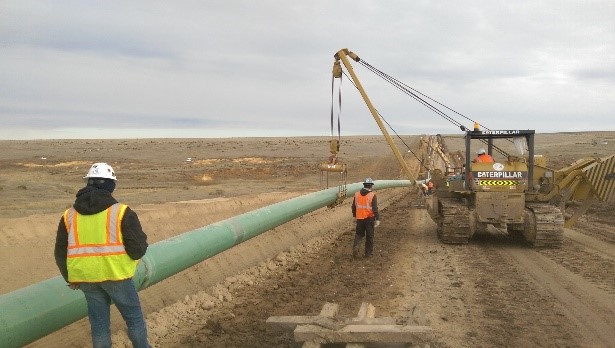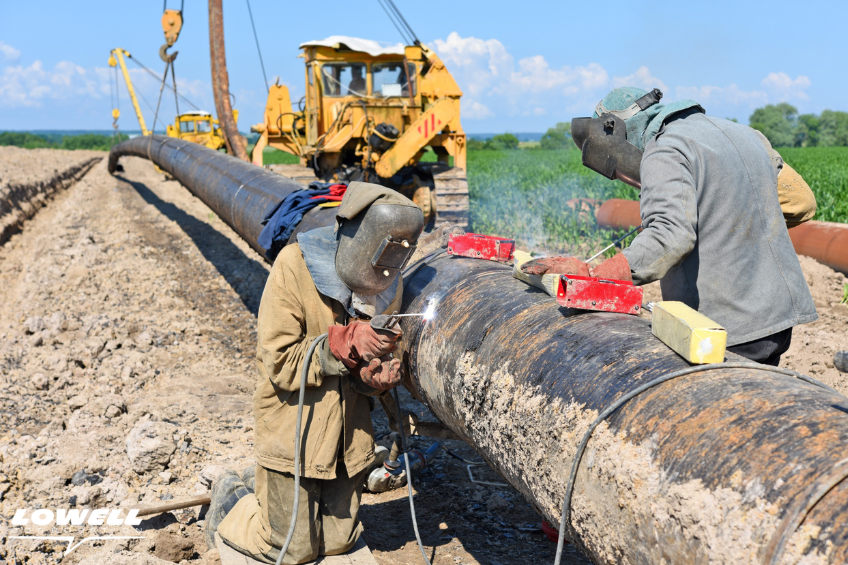A Comprehensive Guide to Comprehending Pipelines and Their Duty in Construction
Pipes are important elements in construction, serving important features in waste, gas, and water monitoring. Their option and application can greatly influence a building's efficiency and safety. Various materials, such as PVC, copper, and PEX, offer distinctive benefits matched to details demands (Creek Pipe Midland). Comprehending these aspects is essential for any construction project. As one discovers the ins and outs of pipes, the ramifications for compliance and public health come to be significantly obvious
The Significance of Pipeline in Construction
Pipelines offer as vital conduits in building and construction, promoting the motion of water, gas, and waste throughout buildings and framework. Their function extends past simple transportation; they are essential for guaranteeing the capability and security of domestic and business settings. Properly mounted pipes add to the efficient circulation of resources, allowing daily activities such as home heating, cooking, and bathing. Additionally, pipelines play a critical duty in waste management, making certain that sewage and wastewater are successfully removed from living spaces.The significance of pipelines is also shown in their influence on public health. Faulty or insufficient piping systems can cause contamination and unsafe problems, making top quality materials and installation practices vital. In addition, pipelines have to adhere to various building codes and regulations, which are developed to safeguard both residents and the setting. Consequently, the significance of pipelines in building and construction incorporates both sensible capability and essential health and wellness factors to consider.
Sorts Of Pipes Made Use Of in Structure Projects
Numerous kinds of pipes play a significant duty in building projects, each made to satisfy specific demands and applications. Among one of the most frequently utilized pipeline types are PVC, which is resistant and lightweight to rust, making it optimal for drainage and air vent systems. CPVC pipes, comparable to PVC, can endure greater temperatures, usually used in hot water systems. Copper pipes are recognized for their toughness and reliability, regularly employed in pipes and home heating applications. Galvanized steel pipes, while much less common today, were when a criterion for water system lines as a result of their stamina. In Addition, PEX (cross-linked polyethylene) pipes are getting appeal for domestic pipes due to their versatility and resistance to scaling and chlorine. Ultimately, cast iron pipes are favored for their sound-dampening residential or commercial properties, frequently used in waste and soil systems. Each pipeline kind serves distinct functions, making sure reliable operation in building tasks.
Usual Products for Pipes and Their Residence
In building and construction, the selection of pipeline products is critical for guaranteeing sturdiness and performance. Steel pipelines use toughness and resistance to high stress, while plastic pipelines supply corrosion-resistant and light-weight choices. Compound pipes integrate the benefits of both materials, making them versatile options for various applications.
Steel Pipeline Options
Steel pipes are essential elements in construction, offering a range of alternatives that satisfy various applications and environmental conditions. The most common products consist of steel, copper, and cast iron. Steel pipes are known for their toughness and longevity, making them appropriate for high-pressure applications. Copper pipes are preferred for their rust resistance and antimicrobial residential properties, commonly utilized in pipes systems. Cast iron pipelines offer excellent audio insulation and are suitable for waste and drainage systems. Each steel type has distinctive benefits; as an example, galvanized steel can stand up to rust, while stainless-steel uses superior deterioration resistance. Picking the ideal metal pipeline depends upon variables such as expense, environmental direct exposure, and the specific demands of the construction task.

Plastic Pipeline Advantages
Plastic pipes have obtained popularity in building as a result of their light-weight nature and flexibility. These pipes, made from products such as PVC, CPVC, and PE, deal excellent resistance to corrosion and chemical damage, making them appropriate for numerous applications. Their convenience of installation further improves their charm, as they can be reduced and signed up with without unique devices. In addition, plastic pipelines are generally much more affordable contrasted to metal choices, adding to reduced general task expenditures. Their smooth indoor surface areas lower rubbing and boost circulation prices, while insulation buildings help maintain temperature level control in pipes systems - Creek Pipe Pipeline Construction. With a vast array of dimensions and arrangements offered, plastic pipes efficiently meet the diverse demands of modern-day building and construction jobs
Composite Pipeline Characteristics
Compound pipes combine various materials to take advantage of their specific toughness, resulting in improved efficiency and durability. Normally, these pipelines are composed of layers that may consist of steels, plastics, and porcelains, each contributing unique residential or commercial properties. The internal layer may be made of a corrosion-resistant product, while the outer layer gives stamina and influence resistance. This combination permits composite pipes to hold up against extreme temperature levels and pressures, making them ideal for a vast array of applications, consisting of supply of water and commercial processes. In addition, composite pipes are commonly lighter than conventional products, facilitating much easier handling and installation. Their flexibility and flexibility to different atmospheres make them a recommended choice in contemporary building and construction projects, guaranteeing long life and efficiency in fluid transportation systems.
Applications of Pipes in Plumbing Solutions

Electrical Conduits: The Role of Pipeline in Wiring
In modern building, electrical conduits play an essential role in making certain the safe and reliable routing of electric circuitry throughout buildings. These pipelines give Related Site a safety path for electrical cords, guarding them from physical damages and environmental factors. Numerous products, such as PVC, metal, and adaptable channels, are utilized relying on the certain needs of the installation.Furthermore, avenues assist in organizing circuitry systems, minimizing the risk of electric risks like brief circuits or fires. They also assist in simpler upkeep and upgrades, as cables can be accessed and changed without considerable disruption to the structure.Proper setup of electrical channels is vital for compliance with building regulations and security laws. This structured strategy not only improves the long life of the electrical system yet also contributes to the total safety and performance of the structure, making electric conduits indispensable in modern-day construction methods.
Picking the Right Pipe for Your Job
Just how can one guarantee the best pipeline option for a construction job? The option procedure begins with comprehending the certain needs of the project, including the type of liquids being moved, pressure ratings, and environmental conditions. Material choices, such as PVC, steel, and copper, must be reviewed based upon durability, corrosion resistance, and thermal properties.Next, one should think about the pipe's diameter and flow capacity to determine efficient operation. Regulatory standards and codes must also be adhered to, as they determine the appropriate products and methods for specific applications. Consulting with professionals and utilizing considerable sources can better assist in making notified decisions.Finally, assessing the cost-effectiveness of various options is vital, stabilizing preliminary costs with long-term upkeep and substitute costs - Creek Pipe Pipeline Construction. By diligently examining these aspects, one can confidently pick one of the most suitable pipeline for their building task, ensuring both capability and conformity

Upkeep and Examination of Pipes in Construction
Proper selection of pipes sets the structure for their lasting efficiency, making upkeep and assessment important elements in building. Regular maintenance warranties that any type of prospective issues, such as leaks, deterioration, or clogs, are determined and attended to quickly, reducing my link costly fixings and task delays. Scheduled inspections, consisting of visual assessments and stress tests, play an important duty in reviewing the stability of pipe systems.Additionally, checking ecological factors, such as temperature level changes and soil problems, can help anticipate deterioration. Using advanced innovations, such as CCTV for interior examinations, can improve the performance of maintenance initiatives. It is important to record assessment searchings for and maintenance tasks to establish a detailed history of the pipeline systems. By prioritizing maintenance and examination, building specialists can extend the life-span of their piping systems, ensuring they run efficiently and dependably throughout the task's duration.
Often Asked Inquiries
How Do Pipes Influence Power Efficiency in Structures?
Pipelines greatly influence power performance in buildings by controling home heating and cooling down systems. Correct insulation and materials decrease power loss, while reliable pipes designs reduce water usage, eventually bring about lower energy consumption and operational expenses.
What Laws Govern Pipeline Installment in Building And Construction?
Regulations governing pipe installation in construction usually consist of nationwide and neighborhood building ordinance, pipes codes, and security criteria. These warranty conformity with architectural stability, product specs, and health and wellness demands, promoting safety and efficiency in construction practices.
Can Pipes Be Recycled After Usage?
The question of pipeline recyclability is significant. Several materials, such as steel and certain plastics, can be reused efficiently. Nonetheless, the condition and sort of pipe impact reusing expediency, necessitating appropriate evaluation before disposal.
Just How Do Weather Influence Pipe Performance?
Climate condition significantly affect pipe efficiency. Severe temperatures can trigger development or tightening, while moisture may find cause deterioration. Additionally, heavy precipitation can boost dirt stress, affecting stability and general performance of the piping system.
What Are the Indicators of Pipeline Failing to Look For?
Signs of pipe failure include leaks, unusual noises, discoloration of water, decreased water pressure, and visible rust. Routine assessments can assist identify these concerns early, guaranteeing and avoiding expensive repair work system performance in the long term. Pipes play a pivotal duty in waste monitoring, making certain that sewer and wastewater are successfully eliminated from living spaces.The significance of pipes is also reflected in their influence on public wellness. In building, the choice of pipe products is important for making sure toughness and functionality. Metal pipelines use stamina and resistance to high pressures, while plastic pipelines offer corrosion-resistant and light-weight options. Additionally, pipelines are utilized to remove wastewater, attaching toilets, sinks, and drains pipes to local sewage systems or septic tanks.Different kinds of pipes, such as PVC, copper, and PEX, are selected based on elements like durability, expense, and specific application needs. How can one assure the best pipeline selection for a building and construction job?